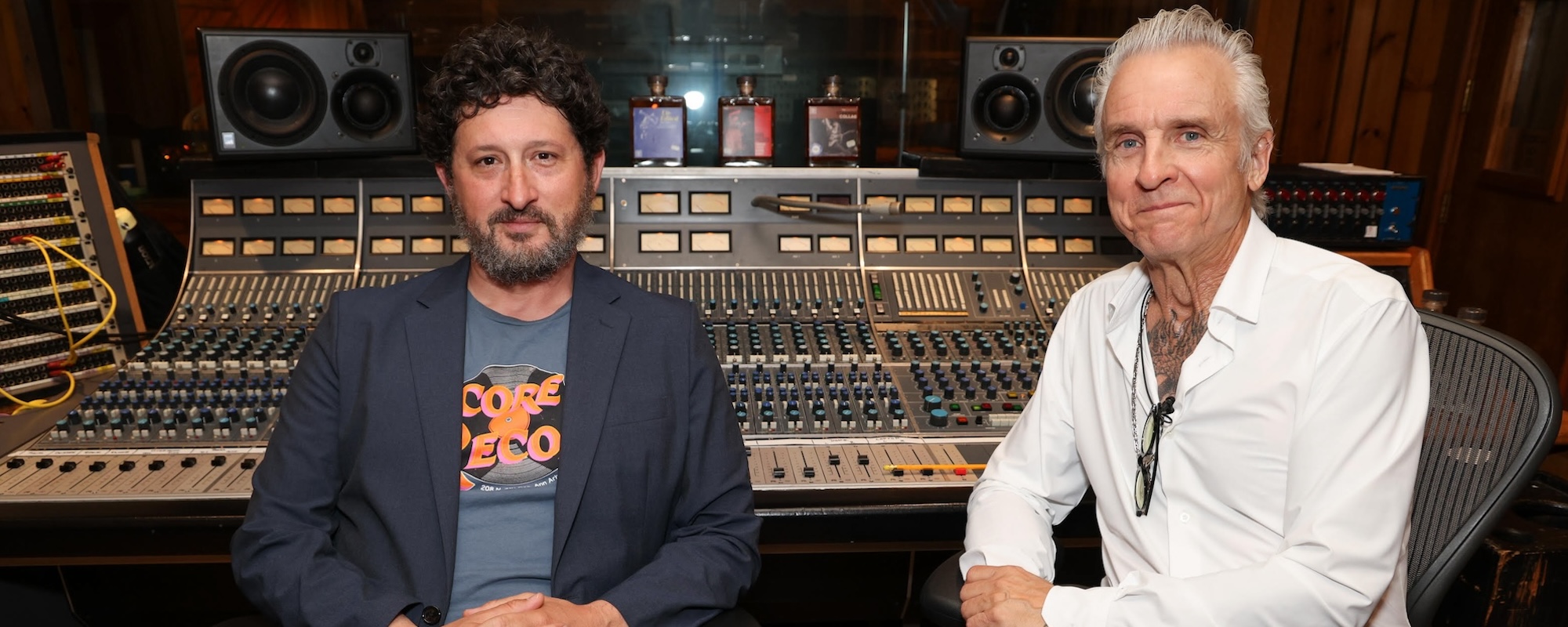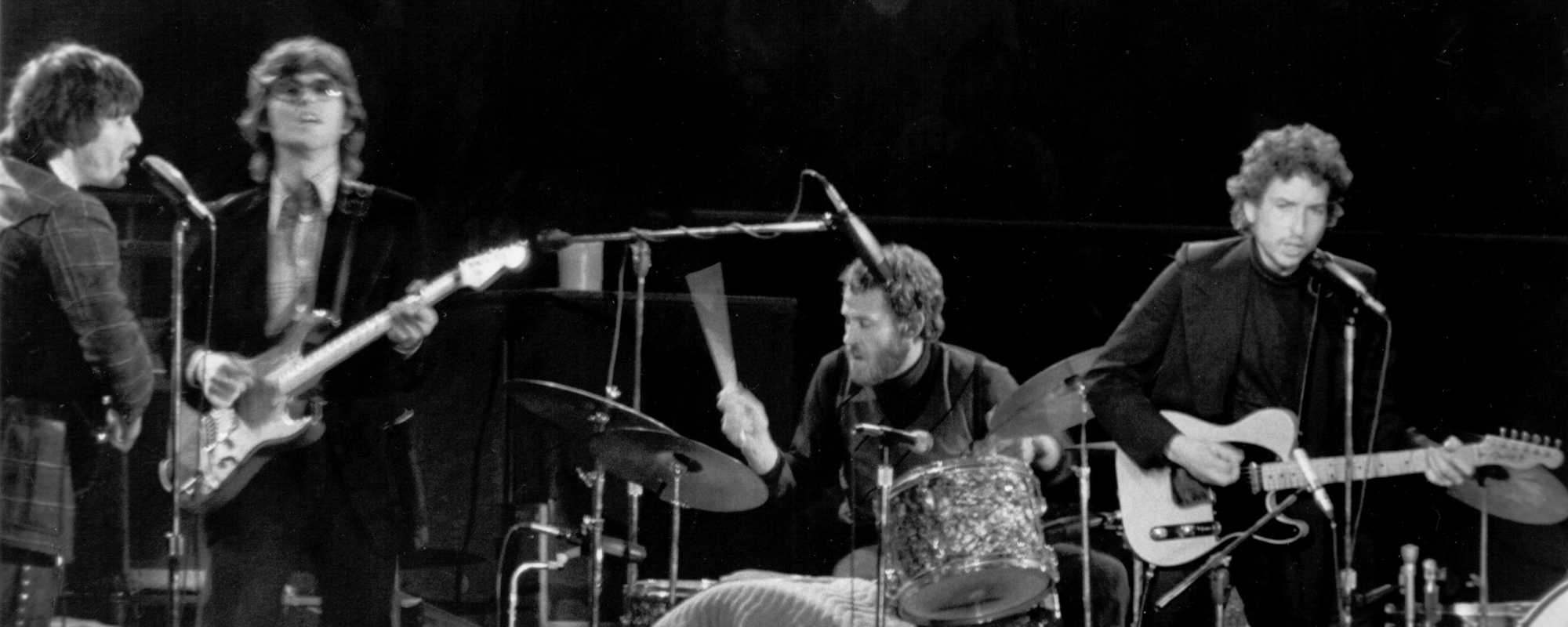American IV: The Man Comes Around was Johnny Cash‘s coda. His final album before he died in 2003 was filled with original songs, and his interpretations of others by Sting, Depeche Mode, a Hank Williams classic with Nick Cave, and a haunting cover of Nine Inch Nails’ “Hurt.” Cash’s contemplations of impermanence, and the last pieces of pain, regrets, and more struck Peter Perrett in 2007 and made him want to make the best album of his career.
“Something inside me would like to make my best-ever album,” Perrett said. “Seeing Johnny Cash doing his best work right at the end, makes me feel like just because I’m old doesn’t mean I’m useless.”
That year, Perrett reunited and toured with The Only Ones, 27 years after the band released its third and final album, Baby’s Got a Gun, and following the band’s reemergence that year when a Blink-182 cover of their 1978 song, “Another Girl, Another Planet” appeared on the Travis Barker reality series Meet the Barkers.
A decade after regrouping with the band, Perrett resurfaced again, this time completely sober (since April 8, 2011, the day of his 59th birthday) following a nearly 40-year addiction to drugs. By 2017, Perrett released his debut solo album How the West Was Won. A second, Humanworld, followed in 2019, along with a UK tour, that reunited him again with the Only Ones’ bassist Alan Mair and guitarist John Perry; drummer Mike Kellie, who later went on to work with the Who, died in 2017 at 69.
During the pandemic lockdown, Perrett continued writing and working along with his sons, guitarist and producer Jamie, and bassist Peter Jr., and accumulated more than enough songs, which he later filtered down to 20 for his third album The Cleansing.
“When the world becomes so bleak, it’s time to tear it up and start again,” recounts Perrett from a 2024 interview in Berlin and the inspiration behind the album title. “‘The Cleansing’ related to the world, and to me.”
Videos by American Songwriter
When everything started reopening in London in 2021, Perrett initially booked a studio to record in November, but fate delayed the album for several more months when Perrett contracted COVID-19 during a Fontaines DC after-party and broke his hip during a fall while hospitalized. “It made me appreciate that I was still here, but I was sort of apprehensive about how long I still had,” shares the 72-year-old Perrett, who was also diagnosed with chronic obstructive pulmonary disease (COPD), a result of years of drug use. “When something like that happens, your approach to life, your mortality is brought to the forefront.”
As soon as he could stand up without crutches, Perrett got in front of a microphone at home and started recording. “It was important to get my vocals down while I was still there so that they could be finished off if anything did happen,” he says. “My son, I would trust him to put them in a musical environment that I’d be happy with. But as you can see, my worst fears never came to reality and I did continue with this abject life that I live.”
Perrett later reconnected with Fontaines D.C.’s Carlos O’Connell, who had moved to his neighborhood and contributed to eight tracks on The Cleansing including the more orchestrated “All the Time,” a string quartet and piano symphony that breaks midway into the album.
“He [O’Connell] was a great inspiration,” says Perrett. “I’ve got the support of my family, having my two sons. They’re my musical carers, the people who have encouraged me to use music as therapy and to start playing again. I didn’t play the guitar for a long time since I was in a desolate place, so the album became family, plus friends, and neighbors.”
The Cleansing is 20 songs of survival, from overcoming addiction, getting his voice back, and living through the string of health issues that plagued Perrett in recent years. Get your f–king head on right…leave that darkness far behind…insults don’t improve with age…just move on leave all the rage…keep that anger in its cage Perrett prods in “Survival Mode,” a note on the destructive nature of social media. “It’s advice to myself and to other people to not engage on social media because it’s such a toxic arena,” says Perrett. “It’s a total cesspool.” He laughs, “And I’ve got to learn to take my advice.”

Filled in by a cast of familiar characters, Primal Scream’s Bobby Gillespie, who also lives around the corner from Perrett, and O’Connell join on the opening “I Wanna Go With Dignity,” one of the first two songs Perrett wrote along with the more Only Ones-scratched “Back in the Hole.”
“I Wanna Go With Dignity” faces life and all its ends—Don’t wanna overstay my welcome—and is dedicated to the late Hot Press reporter Fiona H. Stevenson (Fay Wolftree), known as the “high priestess of punk,” who died in 2003. The song was inspired by journalist David Cavanagh, whom Perrett had known since the early ’90s; Cavanagh died by suicide in 2018.
Dream Wife guitarist Alice Go enters on the burning “Disinfectant” and the sentimental punk ballad “Solitary Confinement” was written by Perrett toward the end of production to give Johnny Marr—who also appears on the latter Cleansing track “World In Chains”—a blank canvas to work in his guitar.
“Johnny was a big Only Ones fan and used to come to gigs when he was 15,” says Perrett. “He’s always been a great supporter of mine encouraging me to get back into this. When people who are musical icons themselves, are so appreciative and say it would be an honor to contribute, it gives you an impetus for the whole project.”
The songs, says Perrett, scan love, the human condition, the existential, and the metaphysical. “All my songs are very personal,” says Perrett. “I’m the common thread, so the different subject matter is always linked to me because it’s me writing and my style of writing. Some people think I’m sort of doom-laden and depressed, but it’s just my gallows humor and the state of me and the state of the world. You have to find humor in it if you want to wake up the next day.”
“Art is a Disease” is Perrett’s ode to the craft of music as he’s always gone about it—Art is a crusade for the unknown soldier. “In the ’60s, when I was 13, I heard Bob Dylan, and when I was 15, I heard the Velvet Underground,” he says. “They were my escape from the world, and for a long time, all young people would do was listen to music and go to gigs. Now with video games, phones, and people consuming music with a Spotify playlist, it’s a lazy way of discovering music, but it’s a burden that musicians have to bear.”
The song, Perrett continues, is “a hymn for struggling artists” today. “I’m lucky enough that before I retired when I was 28, I did have the beginnings of a career, and there are still people alive who saw me back when I was young and vital, so I’ve got some audience,” says Perrett. “But for my kids, who are musicians, and for other people … there are a lot of talented people out there that will never find an audience, because there’s more musicians than there are actual listeners these days.”
And though Dylan and Lou Reed were his songwriting heroes, Perrett admits he’s always had a “unique talent” for writing lyrics. “They’re the only two people whom I wish I’d written things that they’d written,” says Perrett. “I’m a very humble person, but I’m arrogant about my taste. I’ve got a very idiosyncratic taste, and I wouldn’t bother writing if I didn’t think I was better than everybody else.”
The Cleansing is a second coming for Perrett who remembers spending most of the 1990s in what he called a “vacuum” existence and barely picked up the guitar or played for more than three decades, with the exception of the 1996 album Woke Up Sticky with the band The One.
“You realize there’s no meaning to life, but you try to acquire some wisdom from experience,” says Perrett reflecting on this period. “When you’re younger, you’re very impulsive and you don’t think of consequences and by the time you’re a septuagenarian, you realize that there are consequences to your actions. My writing is more reflective, more considered, and not as impulsive as I used to be.”

Not playing guitar for half his adult life, Perret believes may have informed his approach to music now. “It’s like I’ve been born again, and I’m experiencing everything for the first time,” he says, “and that’s why I’m enjoying it so much.”
Citing “Art is a Disease” again, Perrett says “It’s just something that I can’t stop myself from doing. ‘Art is a disease,’ and it’s a life sentence if you’re convicted.”
Now, Perrett is thankful for that disease, along with his 56-year marriage to wife Zena, and the opportunity to connect with his two sons—one of which gave him a granddaughter—through music.
“It’s the greatest privilege,” says Perrett, and how his relationship with his sons sons Jamie and Peter Jr. is different from the disconnect he had with his parents, who died when he was around 30. “It’s a dream, and it would have been impossible without them,” he continues. “I always describe them as my musical carers. They’re the people that when they had a band would encourage me and say ‘Come upstairs dad, just sing a song,’ when I was very reluctant to. Through their coaxing, they gradually got me back into rehearsing, then my wife booked some gigs in 2015.”
With The Cleansing out, Perrett has a new appreciation for everything and doesn’t take one day for granted. “I’m 72,” he says, “and just grateful to still be alive.”
And with a little help from family and friends, Perrett has delivered his album, yet.
Photo: Steve Gullick













Leave a Reply
Only members can comment. Become a member. Already a member? Log in.